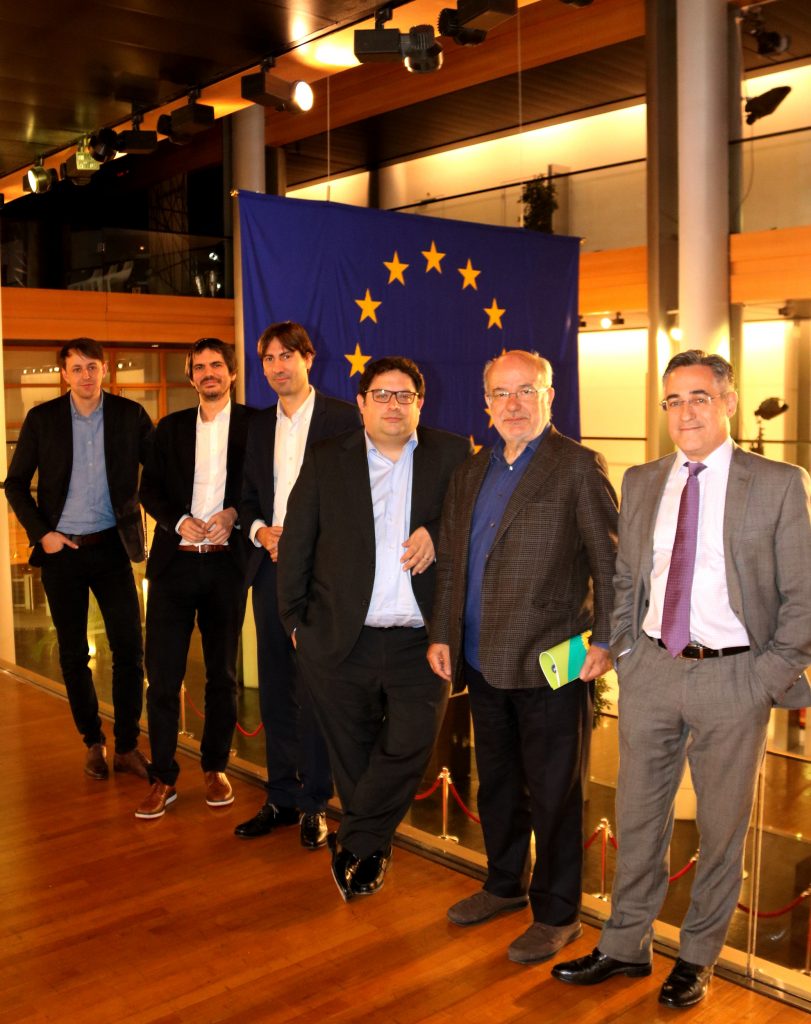13.06.2017 - 09:43
|
Actualització: 14.06.2017 - 09:46
The Catalan language has been spoken in the European Parliament for the first time. Catalan MEP, Francesc Gambús, was the first to disobey the President of the EU Parliament, Antonio Tajani, by speaking Catalan to commemorate the 25th anniversary of the European Charter for Regional or Minority Languages (ECRML). Then, Catalan MEPs from left-wing pro-independence ERC and liberal Catalan European Democratic Party (PDeCAT) followed his example. This protest comes after Tajani vetoed the petition of the European Parliament’s Intergroup for Minorities to allow the use of non-official languages on June 12th, as an “exceptional” measure to commemorate the 25th anniversary of the Charter. The petition was not only rejected but the EU Parliament VP Pavel Telicka also warned at the beginning of the session that it was “forbidden” to use any non-official language during the plenary.
“I know that somebody has suggested the possibility of speaking in their own language which is beyond the scope of the EU’s official languages. It is not possible and therefore we will continue using the EU’s official languages,” warned Pavel Telicka, one of the vice presidents of the Eurochamber, this Monday at the beginning of the plenary session.
Catalan MEP Frances Gambús ignored the warning and spoke in Catalan. After being interrupted twice, he was asked whether he was speaking in Catalan before. “I’m afraid I have to apply what I previously said, Tajani hasn’t allowed that,” Telicka insisted.
“I understand that the regulation doesn’t prevent me from using another language, it simply says that it is not going to be translated,” said Gambús, in defense of his right to speak his “mother tongue”.
The initiative to allow the use of Catalan, promoted by ERC MEP, Josep Maria Terricabras, received the support of Tajani’s advisor for citizenship and languages, Markus Warasin. However, it was finally rejected by his cabinet chief, the Spaniard Diego Canga. However, given Gambús’ resistance to changing languages, Telicka allowed him to proceed. Then, since the regulations did not expressly forbid it, he allowed the other MEPs to use other languages that do not have official status in the EU Parliament.
The speeches
“Before being elected, President Tajani promised to defend linguistic diversity,” said Terricabras during his remarks. “This was a good occasion for him to fulfill his commitment. However, we haven’t found the support we hoped for,” he said. “I regret that,” he added. For two months, Terricabras had tried to get the EU Parliament to promote multilingualism, coinciding with the 25th anniversary of the European Charter for Regional or Minority Languages (ECRML). “I hope that in the future there will be a broader vision and more decisiveness regarding the defense of multilingualism by this Parliament’s president,” he emphasized.
Terricabras made his remarks in Catalan and the PDeCAT MEP, Ramon Tremosa, joined his colleagues by doing the same. “When Catalan continues to be forbidden in this Parliament and European democracy fails to go beyond the Spanish Government’s vetoes, the EU displays its weakness and drifts farther away from Catalan citizens,” complained Tremosa.
MEPs from the Valencian Community, the Basque Country, and Galicia followed the Catalan MEPs’ example and spoke in their mother tongues. “This is our way to denounce that the ECRML was written 25 years ago and still we are not allowed to use our own language in the Parliament, which is supposed to represent all of the citizens in Europe,” said Valencian MEP, Marina Albiol.
Tajani’s ‘no’
Catalan MEP Josep Maria Terricabras, co-president of the European Parliament’s Intergroup for Traditional Minorities, National Communities and Languages, suggested to Tajani that he allow the use of non-official languages. Together with Hungarian MEP Kinga Gál and Finnish MEP Nils Torvalds, he exchanged emails with Tajani on May 3, 17, and 30 and explained to him that the initiative “could be an important symbolic gesture towards multilingualism in the European Parliament” as well as a “pertinent homage” within the 25th anniversary of the ECRML framework.
In their first letter, Terricabras, Gál, i Torvalds asked Tajani to allow “the occasional use of minority languages or other languages besides those 24 that enjoy official status in the EU Parliament” during the MEP’s interventions on June 12th. Tajani’s advisor in this matter, Markus Warasin, considered the proposal to be appropriate and encouraged the MEPs to continue with the initiative.
However, Tajani’s chief of staff, the Spaniard Diego Canga, dismissed the initiative. “The EU is not part of the Convention which passed the ECRML and several member states, such as Belgium, Bulgaria, Lithuania, Latvia, Ireland, Greece and others haven’t even ratified it,” wrote Canga.
Although the three Catalan MEPs wrote a formal petition to meet Tajani, the President never received then and his staff didn’t reply to the letter at all. “Tajani supports linguistic diversity as a form of cultural richness and European traditions,” said Canga in a letter addressed to Terricabras, Gambús, and Tremosa. However, he insisted that “the use of non-official languages in the European Parliament’s plenary sessions is not contemplated in rule 158 of the European Parliament regulation”.
However, during his campaign to become President of the EU Parliament, Tajani had made a commitment to promote the use of the Catalan language in the Chamber and to support initiatives related to this goal.



